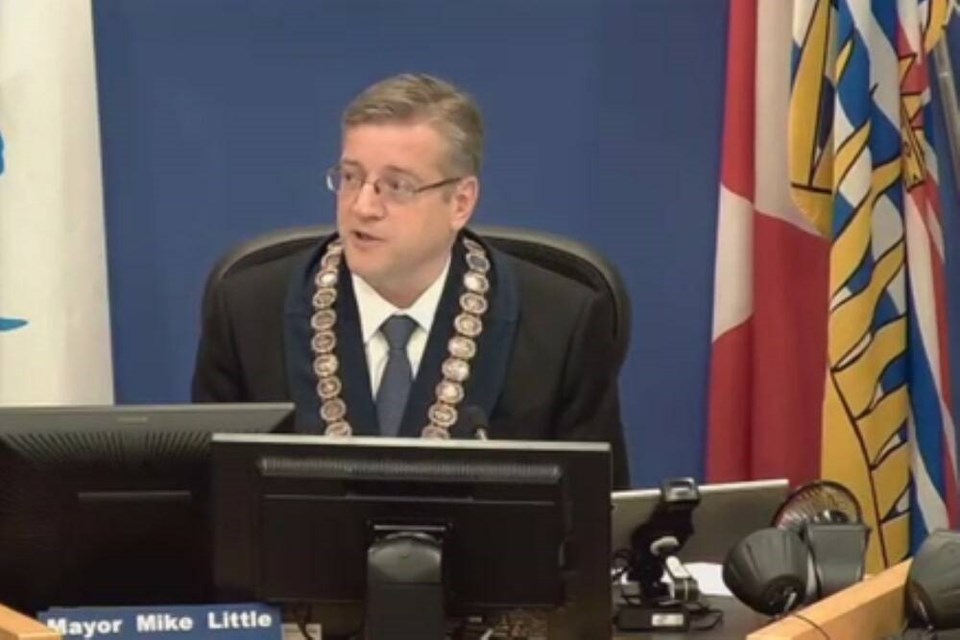A proposed supportive housing project that drew massive backlash from the neighbouring community has been unanimously approved by District of North Vancouver council.
At a regular meeting Monday evening, the hands of all seven elected officials went up in district chambers, voting in favour of building a supportive housing facility at 1200 East Keith Rd. Once built, the six-storey building will include 60 studio apartments and five complex care units for people on the North Shore who are at risk of or experiencing homelessness. The development will receive funding from BC Housing and Vancouver Coastal Health, and be managed by Lu’ma Native Housing Society.
During a marathon public hearing that stretched five long evenings from November to January, more than 120 people expressed their views on the proposal. Most of the opinions expressed in the hearing were against the project, for reasons related to safety and fears that the project would have a negative impact on the community overall. Council also heard from members of the provincial government, health officials and some nearby residents voicing support for the housing.
In contrast to the overwhelmingly negative public hearing input, council was resolutely positive about the project’s potential to bring needed resources for the most vulnerable people living in the district.
There’s no doubt this project is needed, said Mayor Mike Little
“We don’t have enough of either of the types of housing services … both the supportive housing piece or the complex care piece in this facility,” he said. “And it’s something that we can’t always rely on Vancouver to provide in the Downtown Eastside. It’s something that’s important for the whole region to come along and say, ‘We have a hand in this.’”
While Little generally refrained from correcting views during the previous hearing, he mentioned that one mistaken impression was that this would be highly risky housing.
“And the reality is: this is not unprogrammed SROs, like you would find in other places. This has a tremendous amount of operational support,” he said.
As chair of the police board, Little said that impacts and risks in the area would be managed “vigorously,” while giving new residents the space to succeed.
Project worthwhile if just one life saved, councillor says
In an impassioned speech, Coun. Jim Hanson acknowledged that the issue was highly contentious, even dividing his own household. But the councillor made his position of homelessness clear.
“I would like to see the issue of homelessness declared to be an issue of provincial emergency,” he said.
While expressing that he thought the project would save many lives, Hanson said his vote would be worth it if it saved just one.
“I’ll go further. If in fact it is one life that we save, that will justify every hour that I’ve spent in my political journey,” he said.
Coun. Lisa Muri said this is a challenging issue where she hears the fears and concerns of the community but she also has to take the responsibility to do what’s right.
“We are going to commit to a neighbourhood committee. We are going to continue to press the province. We are going to address the challenges. We are going to look at the design of the building to make sure that it is in keeping with the neighbourhood,” she said.
Addressing addiction in the province requires a two-pronged approach, she added.
“It is a disease. It is not a choice,” Muri said. “Housing is not the only thing people that are addicted need. And not all the people in this building will have issues of addiction – some of them just have bad luck.”
During the cold snap in January, Coun. Betty Forbes said she couldn’t stop thinking about people staying outside in the -15 C weather.
“What if that was my mother? What if that was my child?” she said.
Forbes noted a recent announcement from the province that wellness checks and some monitoring over guests would be allowed at supportive housing facilities.
“I think that’s a step in the right direction,” she said.
Change is really hard, Forbes added, before reading aloud a short quote.
“Don’t let perfect be the enemy of good,” she said. “And this is a good project.”
Correction: A previous version of this article incorrectly stated that the province will allow background checks at supportive housing facilities. The province is allowing wellness checks.




